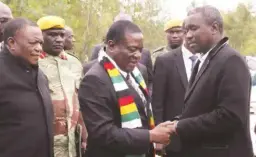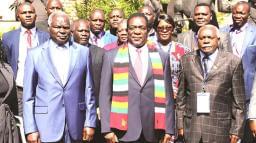Zimbabwean presidential advisor and businessman Kudakwashe Tagwirei is unmoved by an investigation unit’s exposé that he allegedly used fronts and fake invoices to buy nickel and gold mines with a combined value of R431 million in 2019.
Two US investigation units, The Sentry and Open Secrets, released a report titled “Fronts, Fakes, and Façades: How South African and Mauritian Enablers Helped Move Millions from Zimbabwe to Britain”. In response to inquiries by News24, Tagwirei said: “I know that you already know that I don’t comment on such distractions.”
In 2020, the US imposed sanctions on Tagwirei who they referred to as “a notoriously corrupt Zimbabwean businessman”. The sanctions were for “materially assisting senior Zimbabwean government officials involved in public corruption”.
Tagwirei stands accused of using his relationships with the highest political office to gain state contracts and receive favoured access to hard currency.
The report
According to The Sentry and Open Secrets, he moved suspicious funds from the Reserve Bank of Zimbabwe (RBZ) using fronts, false invoices, and offshore financial façades. This was done with enablers from South African company directors, a Mauritian management company agent and a Cayman Islands investment fund.
The investigation reveals how Tagwirei acquired the mines for US$29.5 million (R431 million) from the bankrupt ASA Resource Group, managed by British company administrators Duff & Phelps, now known as Kroll. Documents indicate Tagwirei used Sotic International, a Mauritian company, as his front.
These purchases were made over the course of three payments, each of which involved suspicious behaviour. When redeeming a US$60 million chunk of a sizable Treasury Bill given to Tagwirei’s business, Sakunda Holdings, Sotic’s Zimbabwean subsidiary, Landela Investments, obtained hard currency from the RBZ at a favourable exchange rate.
Landela informed the RBZ some funds were required to purchase Bindura Nickel. South African directors created export invoices that were not recorded in Zimbabwe’s official customs records to move money into Mauritius from Zimbabwe for Sotic’s second £12 million payment.
This raised concerns about whether trade mis-invoicing, a method frequently used in trade-based money laundering, had taken place. To conceal the source of the final £8.7 million payment, Tagwirei transferred his money into Sotic via an intricate offshore façade.
The report also alleges the president of Zimbabwe, Emmerson Mnangagwa, code-named “HE” in emails, and the permanent secretary at the finance ministry, George Guvamatanga, “took a close interest in Sotic’s affairs”. Capital Horizons, a Mauritian company linked to the money transfers through the formation of Sotic, responded to The Sentry, saying it dealt with Christopher Fourie who once revealed he was hired by Tagwirei to establish Sotic.
Capital, in its response, said it had done its due diligence before including Tagwirei as a shareholder in Sotic. However, he was classified as a high-risk politically exposed person but passed the vetting test.
“When conducting media searches, Capital Horizons established that Mr Tagwirei and his company were partners of the Davos World Economic Forum Summit; he was involved in a limited number of commercial disputes; and he was subject to adverse comments from the political opposition party in Zimbabwe.
“These results were mitigated by reasonable explanations and the clear unreliability of the politically motivated statements.
“Capital Horizons addressed the commercial disputes with Mr Tagwirei and obtained from his lawyers an undertaking that he was not subject to any criminal or administrative investigations,” said Capital Horizons.
According to it, Tagwirei did not appear in the ownership of Almas Opportunity Fund, which owns 65% of Sotic. The News24 Africa Desk is supported by the Hanns Seidel Foundation. The stories produced through the Africa Desk and the opinions and statements that may be contained herein do not reflect those of the Hanns Seidel Foundation.
Source NewZimbabwe








